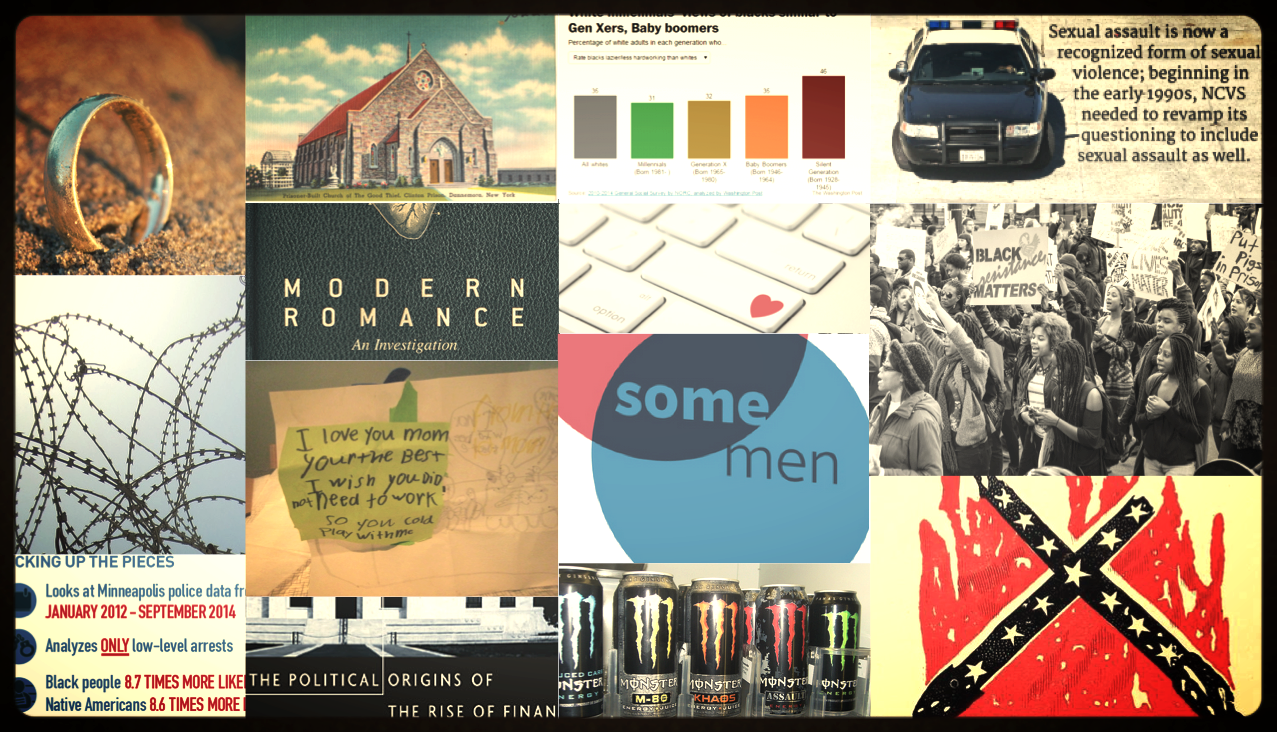Since last we met…
In Case You Missed It:
“Same-Sex, Different Attitudes,” by Kathy Hull. A historical look at the push for marriage equality and the shifts in Americans’ attitudes toward civil rights for gays and lesbians.
“The Return of the Confederate Flag,” by C.N. Le. A 2008 piece examines the resurgence of the Confederate Flag and considers its changing meanings in changing macro-level contexts.
There’s Research on That!
“How Misdemeanors Maintain Inequality,” by Evan Stewart. Research shows that “misdemeanor justice” has a lot of unintended consequences.
Office Hours Podcast:
“Greta Krippner on the Politics of Financial Crisis,” with Erik Kojola. Discussing how the American economy became dangerously dependent on credit and speculation.
Discoveries:
“Political Power and Protest Can Undermine Crime,” by Evan Stewart. New Social Problems research shows that when protest leads to accrued political power, crime goes down in previously underserved communities.
Clippings:
“Ladies Love Serious Men with Animals,” by Caty Taborda. In their New York Times op-ed, comedian Aziz Ansari and sociologist Eric Klinenberg share some of what they found in focus groups with today’s daters.
“Working Moms Face Extra ‘Performance Reviews’,” by Sarah Catherine Billups. Moms on the job are judged as much for putting in less “extra time” as for doing as much as their male colleagues.
“Every Fathers’ Day, More Kids Boast Two Dads,” by Sarah Catherine Billups. Gay, two-parent families are on the rise in the U.S., challenging gender stereotypes about caregivers.
“Prisons’ Dangerous Liaisons,” by Neeraj Rajasekar. Relationships like that between Clinton Correctional staffer Tillie Mitchell and inmate Richard Matt in New York state aren’t all that unusual, a scholar tells Slate.
Give Methods a Chance Podcast:
“Elizabeth Cherry on Consumption, Identity, and Ethnography,” with Sarah Esther Lageson. “It’s interesting to see the ways in which our identities might shape what we find,” Liz Cherry says.
Contexts:
“Same Income, Different Neighborhood,” by Lindsay Fox.
“Egalitarian Preferences, Gendered Realities,” by Lucia Lykke.
“Fifty Years of ‘New’ Immigration,” by Shehzad Nadeem, John D. Skrentny, Jennifer Lee, Zulema Valdez, and Donna R. Gabaccia.
“Sense of Control,” by Lucia Lykke.
“Flash-Mob Movements,” by Melissa Brown.
“How Students Experience Desegregation Efforts,” by Megan Wilhelm.
“Sometimes the Social Becomes Personal: Response to Reznik,” by Paula England.
Council on Contemporary Families:
“Remarriage in the United States,” by Wendy Manning.
“Gender Inequalities in Dual-Earner, College Educated Couples and the Transition to Parenthood,” by Jill Yavorsky, Claire Kamp Dush, and Sarah Schoppe-Sullivan.
“The Continuing ‘Gender Revolution’ in Housework and Care,” by Oriel Sullivan, Jonathan Gershuny, and John Robinson.
“Interpersonal Violence and the Great Crime Drop,” by Samuel Walker.
“A Review of National Crime Victimization Findings on Rape and Sexual Assault,” by Jessica L. Wheeler.
Scholars Strategy Network:
“Varieties of Civic Engagement in Contemporary America,” by Paul Lichterman.
“How Barriers to Citizenship Status Increase Inequality in the United States,” by Sofya Aptekar.
“What Children Experience When Mothers, Fathers, or Both Parents Are Sent to Jail or Prison,” by Allison Dwyer Emory.
A Few from The Community Pages:
- Families As They Really Are: FAMILY Act and fatherhood, income and entitlement in infidelity, and when “real men” do housework.
- Public Criminology on why we need public criminology and a day in the life of a prisoner.
- Sociological Images on race and the criminalization of various drugs; ignorance and a retreat from the confederate flag; recaps of SocImages on same-sex marriage and white men and violence; energy drinks and violent masculinity; and why Millennials are no less racist than Generation X.
- Sociology Lens on the conception of the “Closet” and online dating.
- Cyborgology on those who would dethrone the public sphere and considers how recording crimes and surveilling citizens became crucial to American criminal justice.
- Girl w/ Pen looks at the Young Black America Report and considers whether allies might unintentionally create an intersectionality without women of color.
Last Week’s Roundup
Sign Up for Inbox Delivery of the Roundup
Our Latest Book


Comments